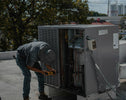
How Can Dust Impact Your HVAC System?
, by Thrive Agency, 5 min reading time

, by Thrive Agency, 5 min reading time
Dirt and dust can reduce the efficiency of your HVAC system, leading to higher energy bills, poor air quality, and increased wear and tear on components. Remember that dust buildup can restrict airflow, making your system work harder to heat or cool your home. It can also cause malfunctions, requiring costly repairs. This makes routine maintenance crucial to ensure your HVAC performs optimally.
Dust usually enters your home through cracks, openings, windows, vents, and other entryways into your premises. Particles from cooking, cleaning, and other daily activities also contribute to dust accumulation. If you have pets inside your home, they can also shed hair and spread dander. Further, pollen and other allergens can also infiltrate your HVAC system, especially when vents and filters aren't regularly maintained.
The efficiency of your cooling and heating system drops significantly due to dust and dirt accumulation. The debris can cause clogs and spread pollutants and allergens, reducing the air quality in your home.
Dust accumulation in your heating and cooling system can lead to various problems that affect your comfort. Several HVAC components are vulnerable to the negative effects of dust, each contributing to reduced efficiency and potential malfunctions.
Regular maintenance for various HVAC components is essential to mitigate these negative effects. Seasoned technicians may recommend replacing air filters, cleaning coils, and inspecting ductwork. Always shop for high-quality HVAC parts and components from reliable sources to ensure optimal performance.
Schedule routine HVAC maintenance work to ensure optimal system performance. Regular maintenance also ensures the longevity of your system. Regular inspection and cleaning prevent dust buildup and help prevent potential issues early, reducing the risk of costly repairs.
Follow these best practices to reduce dust accumulation in your HVAC system.
Upgrading your thermostat can help reduce dust accumulation by controlling HVAC cycling. Installing a programmable thermostat can help maintain consistent temperatures, reducing system cycling that can stir up dust. Smart thermostats offer advanced scheduling to optimize HVAC operation, which helps to reduce dust circulation.
Regular maintenance helps reduce dust accumulation and ensures all HVAC components are working efficiently. Professionals can also perform outdoor unit maintenance to ensure your system is debris-free. In addition, trimming shrubs and plants near your outdoor unit also reduces obstruction, ensuring that your HVAC system runs efficiently.
Quality components from Value Controls ensure that your HVAC system operates efficiently. We carry components from top brands that are built to withstand wear and tear, minimizing the need for frequent repairs and replacements.
Our specialists can help you choose compatible thermostats and other essential components that work best with your HVAC system. Contact us today and shop for wireless thermostats on Value Controls, or call us at 1-800-584-9901.